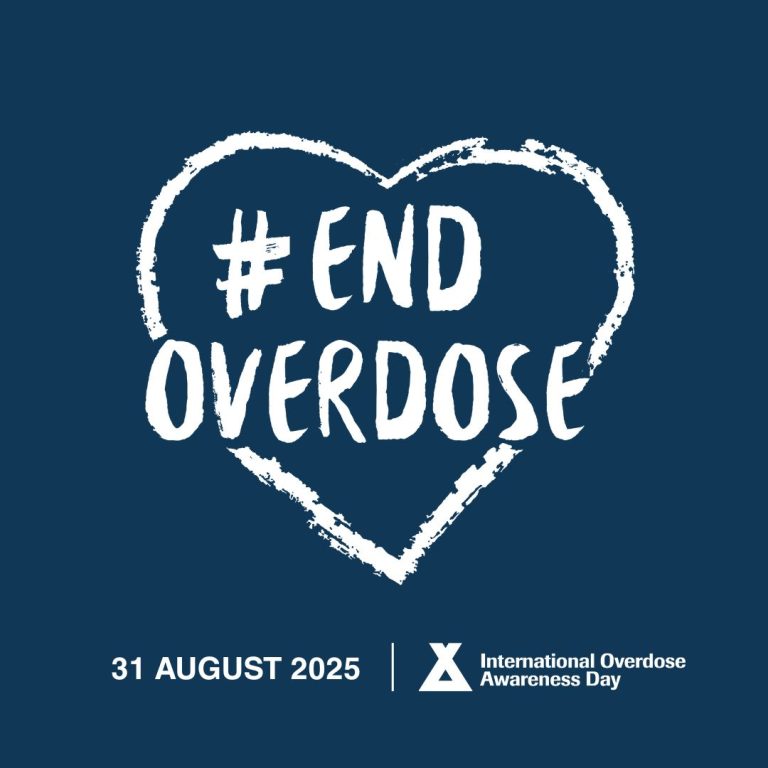
Every year on August 31, Overdose Awareness Day reminds us of the immense loss of life due to the toxic drug poisoning crisis. We mark this day each year as a time of what seems to be unrelenting grief and loss but equally as a reminder of the urgency of this crisis. In the past 9 years since British Columbia announced a public health emergency, 17,322 apparent opioid toxicity deaths were reported, including 915 deaths so far in 2025. Each of these individuals lost are missed and have had an amplifying impact on families, friends, and communities.
We know that many individuals survive toxic drug poisonings, but go on to experience serious and often long-term health consequences. In 2024 alone, Emergency Medical Services responded to 36,266 suspected opioid-related overdoses.
While deaths in BC are trending slightly downward and diagnoses of opioid use disorder appear to be declining, what's causing the change in this trend remains unclear and there is no guarantee it will continue to decrease. We are losing an unthinkable number of people each month, and the numbers are far from what they were before the declaration of the public health emergency in 2016 (e.g. 370 deaths in 2015 compared to 2306 deaths in 2024).. Now is a crucial moment to continue to strengthen evidence-based addiction care and to offer an effective and dependable system of care available to those when they need it most.
While increasingly potent synthetic drugs in the illicit market drive much of the toxic drug crisis, enhancing addiction treatment care in BC is critical to ensuring care-seeking individuals do not fall through gaps in the system. Timely access to safe and appropriate treatment and recovery services is impacted by increasing demand for care.
At Providence Health Care and Vancouver Coastal Health, the Road to Recovery initiative is transforming how people access addiction services by replacing a previously fragmented system with a more coordinated and person-centred approach. Beginning at Access Central, a single front door access point, individuals receive same-day assessment and are triaged into care from trained addiction medicine physicians and nurses. From there, patients are offered same day access to medications that can be sent directly to their pharmacy or can be seen the same day by an addiction physician at the Rapid Access Addiction Centre (RAAC) to further develop a care plan. For those with the most severe risk of complications from withdrawal, next day access to inpatient withdrawal management services can now be offered. One of the highlights of this new model is the addition of transitional care beds, a key pinch point in the system to help transition patients from acute care, withdrawal management to housing or inpatient treatment. Life-saving services and personalized goal-setting are built into every stage, aiming to keep people engaged in care and reduce the risk of overdose while they work toward recovery. For those individuals who are still contemplating treatment, harm reduction services, counselling and peer supports are available. Enhanced after care teams are also available, which link patients to critical recovery supports such as like housing, employment, legal support and counselling.
Preliminary evidence shows the promise of these approaches. Access Central coordinates front-door access with same-day assessments from trained addiction clinicians and wait times have dramatically reduced. Meanwhile 30-day treatment retention for people with an opioid use disorder is higher than the provincial average following discharge from the R2R withdrawal management unit at SPH. Another feature of the model includes Canada’s only acute care overdose prevention site at St. Paul’s Hospital, which supports life-saving services for patients in hospital, and serves as a vital entry point for those ready to engage in treatment.
Nearing a decade into this crisis, R2R demonstrates that treatment models that integrate the full spectrum of care can work. BC now has an opportunity to lead in building a modern, evidence-based addiction care system. Treatment and recovery services don’t work if people aren’t alive to access them, so building relationships and trust with harm reduction services, such as at the overdose prevention site at St. Paul’s Hospital or low barrier, same say services like the Rapid Access Addiction clinic, are crticial supports to help people interested in treatment take that next step. From there, individuals can transition into withdrawal management, treatment, and recovery services, with supports in place to sustain engagement. Expanding the R2R model across the province will strengthen evidence-based addiction care and provide a critical step toward saving lives and providing a sustainable path to recovery for thousands of people.
Overdose Awareness Day reminds us to look past the numbers. Each life lost should push us into action to ensure our addiction care services and health system becomes more accessible, responsive to patient and family needs, and grounded in evidence. The emerging data tells us that the solution exists. We need to make the necessary care available to all those who need it.
Co-authored by Executive Director of the BC Centre on Substance Use and Adjunct Professor for the School of Nursing at UBC, Cheyenne Johnson and Clinician Scientist at the BC Centre on Substance Use and the Division Head for Providence Health Care’s Interdepartmental Division of Addiction, and Assistant Professor in the Department of Medicine at UBC, Dr. Seonaid Nolan.

